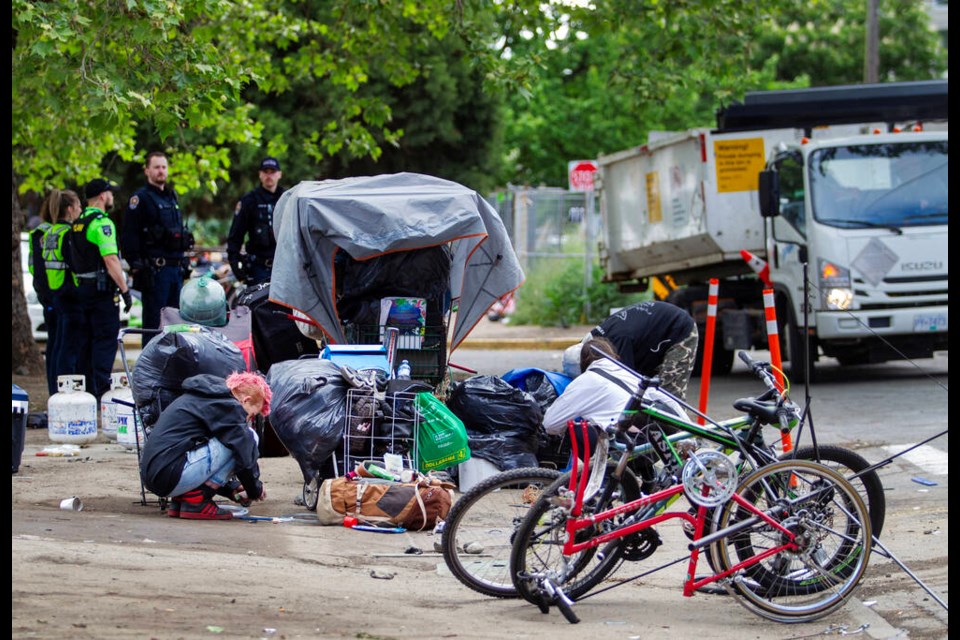Victoria bylaw officers conducted a massive cleanup of the 900-block of Pandora Avenue on Thursday, with the number of tents where people had been living reduced from dozens to three.
The area was cleared of people, tents and belongings in what staff at Our Place, which offers support services in the neighbourhood, said was the biggest cleanup of the block staff had ever seen.
As bylaw officers accompanied by Victoria police officers worked their way down the block, they cordoned off sections of the street using yellow caution tape and photographed items before packing them into trucks to be impounded.
Joseph, who didn’t want his last name published, arrived to find bylaw officers had taped off his belongings. They wouldn’t allow him into the area where he said he had “everything to live, like a bedroom.” Bylaw officers took his name and information and told him he could retrieve his things at a later date.
“I’ll never get it back,” he said, adding that, in his experience, it’s difficult to recover seized possessions.
Bylaw staff returned a wheelchair and a box of drug paraphernalia to him, but he was threatened with arrest when he grabbed a bag of his clothing from behind the tape.
Victoria police officers accompanied bylaw staff to keep the peace and allow the city to conduct enforcement, said police spokesperson Const. Terri Healy.
Mayor Marianne Alto told media at a briefing outside city hall that bylaw officers were “doing the job they do every day.”
Bylaw staff had not been to the block for a couple of days, because they’ve been busy in other parts of the city, so there was more cleanup work to do than usual, she said.
“Everyone can understand that when you do things regularly, it’s incremental. If you lose a couple of days you can be seen to be doing a bit more,” Alto said.
While bylaw officers are on the block each morning to clean up garbage and ask a few people to remove their tents, this event was different, said Jordan Cooper, director of services for Our Place.
“The approach was more people having to actually pack up and go. So, folks were coming in asking us: ‘Where am I supposed to go?’ And we didn’t have answers for them,” said Cooper, calling it an “emotional and tough morning.”
By 10 a.m., many people who had been sheltering for months on Pandora Avenue had dispersed, and Our Place staff didn’t know where they had gone, he said.
“We’re worried because we don’t know where they’re going to have to go and get the supports that they need,” Cooper said.
People are used to the daily bylaw actions on the block, but Thursday’s response, with multiple large container trucks taking away belongings, took staff and people sheltering by surprise, he said.
Bylaw staff said they would be on the block all day and people were under the impression everyone and everything had to go, Cooper said.
Alto said the goal was not to sweep people from the block.
“We will not take people away until there’s a place for them to go. Who’s responsible for that is the next question. Ultimately, it’s a provincial government responsibility,” she said.
Our Place CEO Julian Daly said the roughly 50 tents regularly on the block were down to just three by 3 p.m.
“Anyone who stood for two hours like I did this morning would have been in absolutely no doubt that people were being removed or certainly being robustly requested to leave,” he said.
Daly said he wished Our Place had been warned about the cleanup so staff could have helped prepare people.
Our Place recently surveyed everyone sheltering on the block over a two-week period, collecting personal information on 77 people, including what it would take to help them get off the street. The charity had been working toward helping everyone into housing by the end of the year.
That work will be “much more difficult” because of Thursday’s bylaw actions, Daly said.
It will be impossible to reconnect with some people who have been displaced and the trust built between people sheltering and outreach workers who have been working full-time on the block since January has been undermined, he said.
“That saddens me, and I think it could well turn out to be a massive missed opportunity if we can’t reconnect with those folk,” Daly said.



